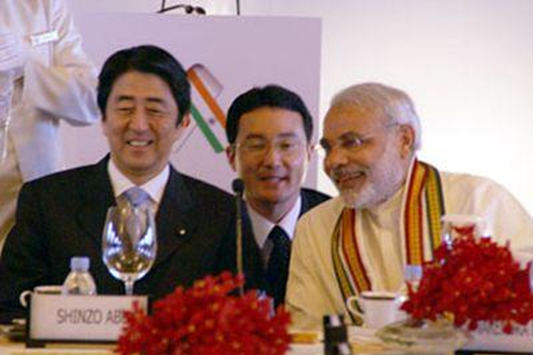PM Modi Makes a Choice, Japan Over China
PM Modi and Japan PM Shinzo Abe strike a special chord

NEW DELHI: Prime Minister Narendra Modi’s foreign policy ship has not developed leaks as yet but certainly wants for adept navigation through waters that can become stormy overnight. Japan was able to convince him to shed caution to the winds, and on the eve of a high level Chinese visit, take sides in favour of Japan in the long drawn Beijing-Tokyo strategic battle.
After four visits to China as the chief minister of Gujarat that carried into a show of bonhomie and goodwill after he became the Prime Minister of India, Modi took a decisive leap into Japan waters where he said, “we have to decide if we want to have ‘vikaas vaad’ (development) or ‘vistar vaad’ (expansionism) which leads to disintegration. those who follow the path of Buddha and have faith on ‘vikas vaad’ they develop. But we see those having ideas of the 18th century century engage in encroachments and enter seas (of others).”
PM Modi did not mention China by name but the reference was clear to all, and an indication that he plans to throw in his lot with Japan and its efforts to rally Asian countries to form a united front against China. In Delhi where the new government had been able to create a perception of drawing India closer to Beijing than Washington this has come as a surprise as Japan is a major ally of the United States. An armed and increasingly dominating China is seen as a threat by the US and its allies in the world with Japan taking a lead to mobilise and unite opposition to China in Asia.
The Prime Minister was addressing business leaders of India and Japan in Tokyo and said that while the entire world accepts that the 21st century will belong to Asia, “I have a question. How should the 21st century be? We have to give an answer to this. It will depend on how deep and progressive our relationship (between India and Japan) is.”
China has reacted cautiously to the comments, but reacted nevertheless. As PM Modi did not mention China by name predictably the Chinese Foreign Ministry spokesperson Qin Gang told reporters “we have noted relevant information about Prime Minister Modi’s visit to Japan. You just mentioned comments made by him. I don’t know what he is referring to.” Instead Qin recalled earlier remarks made by PM Modi where “he said China and India are strategic partners for common development. Good neighbourliness and cooperation between the two countries is of great significance to the prosperity of the whole world and mankind.”
Significantly the perceived anti-China remarks that are already drawing editorial comment in the international media, have come on the eve of Chinese President Xi Jinping’s proposed visit to India later this month. Asked about this by reporters in Beijing Qin said, “I want to stress that China and India are major countries. We both advocate and practice the five principles of peaceful coexistence.”
India and China have worked on bilateral relations but these still remain uncertain in the best of times. Chinese incursions into Indian territory have remained a major cause of concern to New Delhi and as a former foreign secretary said before the PM’s visit to Japan, “there are so many contradictions, that it will be very foolish for this government to ignore others while looking to improve relations with China.”
The Japan visit has been productive and clearly up to the government’s expectations. Work on the high level Chinese visit has begun and will gather pace after the PM’s return from Japan. A former ambassador to China told The Citizen that while he did not expect the Chinese to react directly to the comments as they had not been named, they would factor these into their approach when President Xi Jinping visits India. Beijing that is fast losing friends in the vicinity as it becomes stronger both militarily and economically is clearly looking to ally with India at more levels than one.
PM Modi’s remarks however would have come as somewhat of a dampener for Beijing, particularly as he had the choice of maintaining a silence on this particular aspect during the Japan visit. That he chose not to do so, but instead make almost an announcement of the Indian government’s position on China’s “expansionism” in the region is being seen as extremely significant as it takes bilateral relations between Japan and India to an entirely new plane.



